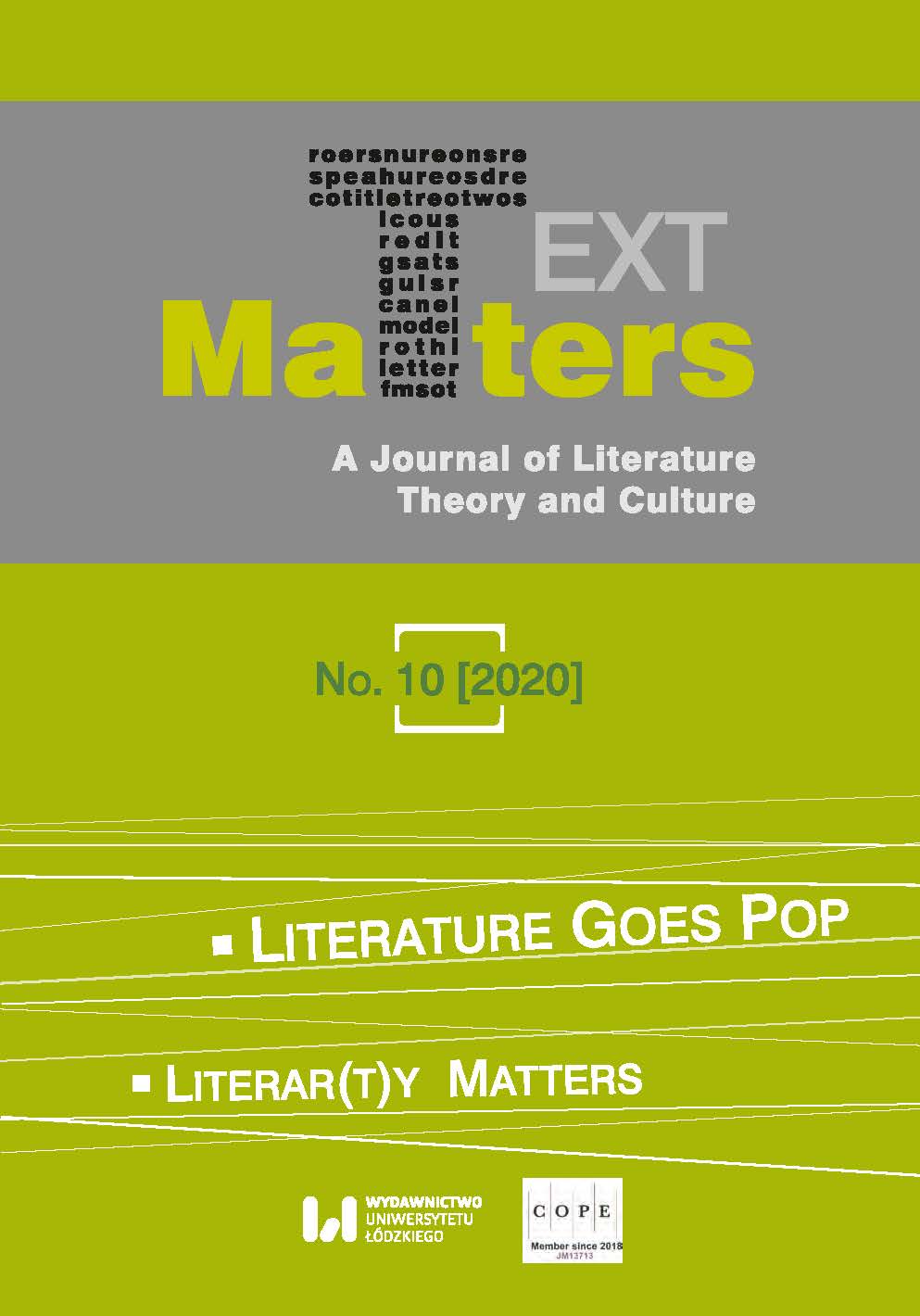Billy Woods’s Literary Intertexts
DOI:
https://doi.org/10.18778/2083-2931.10.11Keywords:
Billy Woods, Daniil Kharms, Flannery O’Connor, rap structure, the absurdAbstract
While—like all artistic forms—it allows for deviation from this standard rule, rap is heavily reliant on building blocks of sixteen bars and a refrain. In addition, rhyme plays a prominent role in structuring rap, which is why the form is also colloquially referred to as “rhyming.” In view of this, Billy Woods’s record Today, I Wrote Nothing was a considerable departure from the existing rap norm. On the record, Woods stylistically adapted a collection of works by Russian absurdist writer Daniil Kharms, which was also called Today, I Wrote Nothing. Kharms was known for writing short prose without any formal structure. Most of his stories deal with absurd situations and slapstick humour. The structure of the fragmented fiction is adapted into rap on Woods’s record. The long rap verses are replaced by short songs without any specific narrative. The record maintains the non-structure of Kharms’s writing, as well as its absurdity, but it abandons any semblance of traditional rap. The second important stylistic and structural choice made in Woods’s record was the integration of aspects of Flannery O’Connor’s writing, particularly its humour and darkness. The article will focus on how Billy Woods integrates intertextuality into his lyrics to give the songs additional layers of meaning.
Downloads
References
“Absurd.” A Glossary of Literary Terms. M. H. Abrams. Boston: Heine, 1999. 1–3. Print.
Google Scholar
Bellow, Saul. “Op-Ed: Papuans and Zulus.” Movies2.nytimes.com. New York Times 10 Mar. 1994. Web. 4 Aug. 2019.
Google Scholar
Boyagoda, Randy. “A Patriotic Deus ex Machina in Flannery O’Connor’s ‘The Displaced Person.’” The Southern Literary Journal 43.1 (2010): 59–74. Jstor.org. Web. 11 Aug. 2019. https://doi.org/10.1353/slj.2010.0006
Google Scholar
DOI: https://doi.org/10.1353/slj.2010.0006
Bradley, Adam, and Andrew DuBois. The Anthology of Rap. New Hampshire: Yale UP, 2010. Print.
Google Scholar
Burgess, Anthony. A Clockwork Orange. London: Penguin, 1972. Print.
Google Scholar
Chang, Jeff. Can’t Stop Won’t Stop: A History of a Hip-Hop Generation. New York: St. Martin, 2005. Print.
Google Scholar
Charnas, Dan. The Big Payback: The History of the Business of Hip-Hop. New York: New American Library, 2010. Print.
Google Scholar
“Cleaning Up.” The Wire: Season 1. Dir. Clement Virgo. HBO, 2002. TV.
Google Scholar
Coleman, Brian. Check The Technique: Liner Notes For Hip-Hop Junkies. New York: Random, 2007. Print.
Google Scholar
Dyson, Michael Eric, and Sohail Daulatzai, eds. Born to Use Mics: Reading Nas’s “Illmatic.” New York: Basic Civitas, 2009. Print.
Google Scholar
Edwards, Paul. How to Rap: The Art and Science of the Hip-Hop MC. Chicago: Chicago Review, 2010. Print.
Google Scholar
Edwards, Paul. How to Rap 2: Advanced Flow and Delivery Techniques. Chicago: Chicago Review, 2013. Print.
Google Scholar
“Flannery O’Connor.” Britannica.com. Encyclopaedia Britannica 21 Mar. 2019. Web. 22 Apr. 2019.
Google Scholar
Gore, Tipper. “Hate, Rape and Rap.” Washingtonpost.com. Washington Post 8 Jan. 1990. Web. 4 Aug. 2019.
Google Scholar
Grandmaster Flash and Furious Five. The Message (Expanded Edition). Castle Communications, 2010 (1982). Deezer.
Google Scholar
“Grotesque.” Dictionary.cambridge.org. Cambridge Advanced Learner’s Dictionary. Web. 22 Apr. 2019.
Google Scholar
Hardy, Donald E. “Towards a Stylistic Typology of Narrative Gaps: Knowledge Gapping in Flannery O’Connor’s Fiction.” Language and Literature 14.4 (2005): 363–74. Sagepub.com. Web. 11 Aug. 2019. https://doi.org/10.1177/0963947005056343
Google Scholar
DOI: https://doi.org/10.1177/0963947005056343
Jay-Z. Reasonable Doubt. Roc-A-Fella Records, 1996. CD.
Google Scholar
Kharms, Daniil. Today I Wrote Nothing: The Selected Writings of Daniil Kharms. Trans. Matvei Yankelevich. New York: Ardis, 2009. Print.
Google Scholar
Kolarič, Jožef. Billy Woods: Virtuoso of Intertextuality. Forthcoming.
Google Scholar
Lamarre, Carl. “Watch Kendrick Lamar Receive the 2018 Pulitzer Prize for Music.” Billboard.com. Billboard 30 Aug. 2018. Web. 5 Dec. 2018.
Google Scholar
McCarthy, Cormac. Blood Meridian or The Evening Redness in the West. New York: Vintage, 1992. Print.
Google Scholar
Menand, Louis. “Young Saul: The Subject of Bellow’s fiction.” Newyorker. com. The New Yorker 4 May 2015. Web. 22 Apr. 2019.
Google Scholar
O’Connor, Flannery. The Complete Stories. New York: Farrar, Straus and Giroux, 1971. Print.
Google Scholar
Pate, Alexs. In the Heart of the Beat: The Poetry of Rap. Lanham: The Scarecrow, 2010. Print.
Google Scholar
“Piece.” Dictionary.cambridge.org. Cambridge Advanced Learner’s Dictionary. Web. 22 Apr. 2019.
Google Scholar
Schloss, Joseph G. Making Beats: The Art of Sample-Based Hip-Hop. Middletown, CT: Wesleyan UP, 2004. Print.
Google Scholar
Schmidt-Jones, Catherine, and Russell Jones. Understanding Basic Music Theory. Houston: Connexions, 2007. Print.
Google Scholar
Sharpton, Al. “No Justice, No Peace: Why Mark Duggan’s Family Echoed My Rallying Cry.” Theguardian.com. The Guardian 10 Jan. 2014. Web. 22 Apr. 2019.
Google Scholar
Toynbee, Arnold Joseph. “Julius Caesar.” Britannica.com. Encyclopaedia Britannica 13 Feb. 2019. Web. 22 Apr. 2019.
Google Scholar
Woods, Billy. Today, I Wrote Nothing. Backwoodz Studioz, 2015. CD.
Google Scholar
Zilla Rocca. 96 Mentality. Three Dollar Pistol Music, 2019. Digital.
Google Scholar
Downloads
Published
How to Cite
Issue
Section
License

This work is licensed under a Creative Commons Attribution-NonCommercial-NoDerivatives 4.0 International License.













